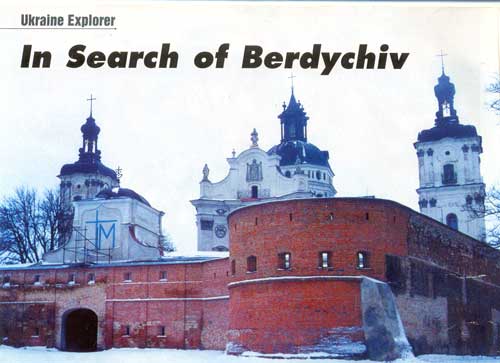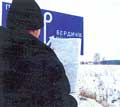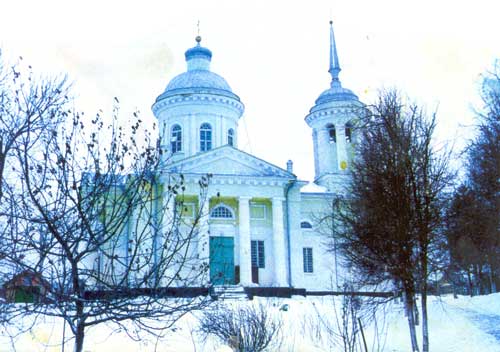by Stuart Allen

| French novelist Honoré de Balzac got married there, and literary giant Joseph Conrad was born there. Yet Berdychiv, a small town in Zhitoymyr is also a byword for rural backwardness and impoverishment Will the real Berdychiv please stand up? |
| (1)When a Ukrainian inquires whether you are from Berdychiv, rest assured they are not complementing you on your linguistic ability but rather, hinting that you appear to be somewhat unworldly. Indeed, for many locals Berdychiv is the epit- ome of everything rural and backwards, the type of place which your sophisticated city friends laugh hysterically at whenever you voice the opinion that living in a Ukrainian village might not be so bad at all. It wasn’t always this way. In 1884 a book about Russia and Ukraine entitled ‘La Russe et les Russes. Kiev et Moscou’ by Victor Tissot was published in Paris. In it Tissot gave more space to Berdychiv than to either Kyiv or Moscow, an extraordi- nary move and doubtless due to the fact that Balzac had married in the town 34 years earlier. But unlike Tolstoy, Balzac hadn’t gone off to the countryside to marry a simple and honest peasant girl who would appease his tortured soul. No, when Balzac stood before the alter inside St Barbara’s Roman Catholic Church he was next to Evelina Ganska, a Polish noblewoman with whom the novelist had corresponded with since the winter of 1834. Though part of the Russian empire at the time, the | (2) Berdychiv which Balzac knee had a distinctly Polish feel. From 1320 Berdychiv was the biggest fortified town belonging to the Tyszkevyches, a powerful Polish family renowned for their beauty and stately bear- ing. One of the ways in which the ruling Catholic Poles imposed their power on the Orthodox peasantry was to build churches, Though part of the Russian empire at the timer the Berdychiv which Balzac knew had a distinctly Polish feel. From 1320 Berdychiv was the biggest fortified town belonging to the Tyszkevyches, a powerful Polish family renowned for their beauty and stately bearing. the most impressive of all being the monastery dedicated to the Virgin Mary. The courtyard is surrounded with thick walls with bulwarks and a rampart. In 1648 the monastery was decimated by Bohdan Khmelnitsky’s Cossack host but was rebuilt in 1663, with considerable donations coming |
| (3)directly from the Vatican. The monastery boasts cells, two high belfries and a pair of enormous churches both above and below ground. At the time it was one of the most impressive buildings in Ukraine and as such a key symbol of Polish power and the Counter Reformation. The town was a target for Khmelnytsky’s men not only because it was a centre of Polish power but also home to a large Jewish population. From the 16th century the towns advantageous geo- graphical position on a busy trade inter- section attracted many Jewish merchants and tradesmen. Despite persecutions and massacres Jews continued to come to Berdychiv | (4) and by the 19th century the town, with the exception of the castle and monastery, was overwhelmingly Jewish. Indeed on arriving in Berdychiv, Balzac wrote in a letter to a friend that “The place is thoroughly Jewish, Jews are every- where”. The church of St. Barbara, in which Balzac married his Polish bride, was built in 1828 with money collected from the towns prosperous, and mainly Polish, middle class. As a building the church is fairly stan- dard neo-classical fare but still goes some way in showing that Berdychiv was once a reason- ably affluent town with pretensions. Balzac’s bride was an embodiment of the spirit of |
| (5) these times. In 1832, Evelina, a countess mar- ried to an elderly Ukrainian landowner, wrote to Balzac expressing admiration for his writ- ings. Balzac was at the height of his literary powers and received many such letters from smitten ladies of leisure who had grown weary of life on vast and uninteresting estates but nonetheless the French novelist seemed particularly smitten by Evelina. They met twice in 1833 in Switzerland and a second time in Geneva, where they became lovers. When Evelina’s husband died there was final- ly a chance for them to wed but, mainly because of Balzac’s debts, the marriage didn’t take place until 1850. Balzac was obviously relieved to get it all over and done with writ- ing “…Only from me should you hear about the happy ending to a great and beautiful drama of the heart which has lasted for 16 years. Three days ago I married the only woman I have ever loved, whom I love even more than before and will love till death itself.” Berdychiv’s other claim to fame is that Jozef Teodor Konrad Korzeniowski, better known in the west as Joseph Conrad, was born there in 1857. Conrad is arguably one of the finest writers in the history of the English lan- guage but remains rather unappreciated in Ukraine. The reason for this is that Joseph was first and foremost, a Pole. Joseph’s father, Apollo, celebrated the birth of his son with a poem entitled ‘To My Son, born in the 85th Year of Muscovite Oppression”. He wrote a further poem when his son was baptized, containing the words “Tell yourself that you | (6) are without land, without love, without Fatherland, without humanity – as long as Poland, our Mother, is enslaved.” Conrad’s father was arrested in 1863 and the four year old Josef followed his mother and father into a north Russian exile. At six years old Conrad signed himself ‘grandson, Pole, Catholic and nobleman’ and in later life his most vivid childhood memories were of his mother wearing black in mourning for Poland’s suf- fering and the listening to his great-uncle’s tales of eating roast dog during Napoleon’s retreat from Moscow. At sixteen Conrad went off to join the navy, became a novelist and ended his life in the English county of Kent. When we see Conrad in this light it seems understandable that there is no real desire amongst Ukrainian’s to claim him as one of their own and especially amongst the stay at home people of Berdychiv. Yet travel broad- ened Conrad’s mind and his greatest work, Heart of Darkness’ is a brutal swipe at the grand imperial dreams which filled many European heads, leading one critic to hail it as “the death of romanticism.” So what of present day Berdychiv? Well, of those Jews who survived the horrors of the holocaust, many have migrated to Israel, resulting in a population drop from around one hundred thousand to less than ninety thousand. The Jewish cemetery is still a pop- ular stop for Jewish tours but visitors tend to stop for only a few hours. Others have also left the town. In a pattern repeated across small-town Ukraine, youngsters are leaving in droves, lured by the lights of big cities and money which can be found in the West. With |
| (7) it’s buildings reflecting the glory of a oncegreat foreign power and the absence of youth, it would be easy to conclude that Berdychiv is dying. But as with all small towns there is a sense of community which is, hard for locals to tear themselves away from. Many young people leave the town because they simply have to but the town remains home, and many see themselves returning when they have made their money and are of retirement age. Berdychiv’s main drag is dotted with dozens of Soviet factories but many of these haven’t been operational for years. As Ukraine opens up perhaps tourism is the answer for there can be few small towns which boast such an illustrious past and such a warm traditional Ukrainian welcome! | (8) How to Get There:Berdychiv is situated in Zhytomyr region, not too far from Kyiv. The fastest way to get there is to take road M06 to Zhytomyr (about 130 km), then turn to the south to Berdychiv in the direction to Vinnytsya. It will take you approximately two hours by car .  |
(9) | (10)A suitably impressive church for the great Balzac to marry in. Only he didn’t in this one, nor any of Berdychiv’s grand buildings but the humble St Barbara’s |
